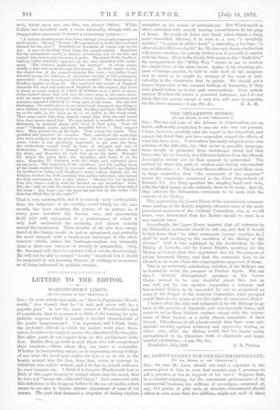THE ORNAMENTS RUBRIC. [To THE EDITOR OF THE "SPECTATOR:] SIL — The
ins and outs of the debates in Convocation, are no doubt, sufficiently perplexing to any one who was not present. I have, however, carefully read the report in the Guard/at, and cannot but think that you have somewhat missed the effects of what has been done. Convocation has really adopted your own. solution of the difficulty, viz., that as far as possible, congrega- tions should be protected from unwelcome ritual, but that those who like to worship in a different fashion from the Church Association should not on that account be persecuted. The method by which this path of wisdom and charity was reached was in this wise :-1. The Lower House affirmed more than once, by large majorities, that "the ornaments of the minister meant the ornaments mentioned in the First Prayer-book of Edward VI. (2.) They specified the surplice, hood, and stole,. with the black gown, as the ordinary dress to be worn ; but (3),, they allowed the Edwardian vestments to be used, with the consent of the Bishop.
This approval by the Lower House of the natural and common- sense reading of the Rubric mightily offended some of the most prominent members of the Judicial Committee, who, as we all know, were determined that the Rubric should be read in a non-natural sense.
Accordingly, the Upper House insisted that all reference to the Edwardian vestments should be left out, and that it should be laid down that "no other ornaments [except surplice, &c.) shall be used contrary to the monition of the Bishop of the diocese." And it was explained by the Archbishop, by the Bishop of Lincoln, and by Canon Bright, speaking for the Bishop of Oxford, that this regulation was for the purpose of giving increased liberty, and that the vestments were to be- allowed to be worn where the congregations approved of them.
This is an eminently satisfactory solution, if the Bishops caa be trusted to resist the pressure of Puritan bigots. But can they ? Several distinguished speakers in the Lower House seemed to be very doubtful about this, and, as was well put by one speaker, supposing a tolerant and fair-minded Bishop to be succeeded by one as prejudiced as some of the Judges of the Judicial Committee, what prospect would there be for peace, or for the rights of conscience, then?
I believe that the only real safeguard is for the Bishops to go back to the practice of Apostolic and sub-Apostolic times, and never to act in these delicate matters except with the concur- rence of their Synod, or a fairly chosen committee of their Synod. Churchmen of all schools would then have some sub- stantial security against arbitrary and oppressive dealing on either side, while the Bishop would find his hands vastly strengthened' in his Christian work of charitable and large. hearted arbitration.—I am, Sir, &c.,


































 Previous page
Previous page